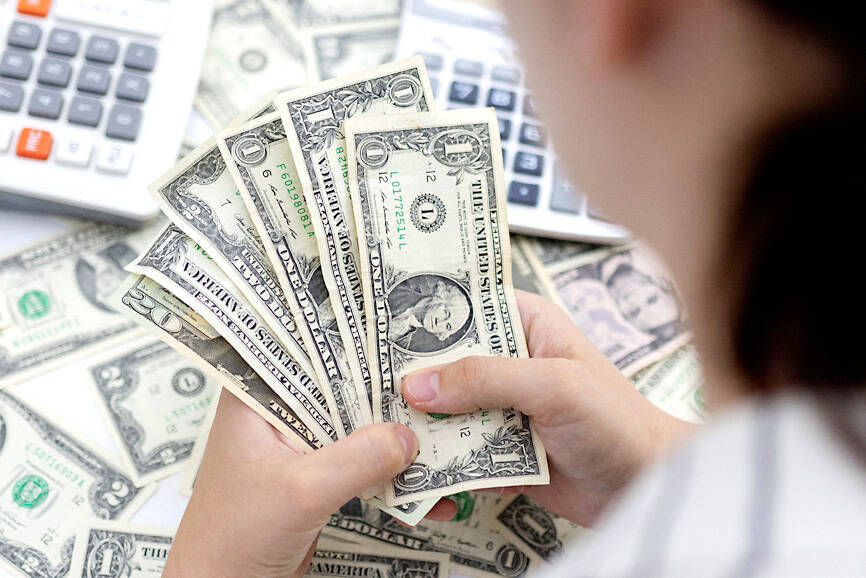A massive transfer of wealth is gaining speed, as billionaires are increasingly padding their vast fortunes with inheritance rather than entrepreneurship, a study by Swiss banking giant UBS Group AG showed yesterday.
Over recent decades, the number of billionaires has ballooned, with surging entrepreneurial activity within tech and other areas ushering fresh members into the super-wealthy club.
However, in its ninth annual report on the world’s billionaires, UBS noted a significant shift in the way such fortunes are being made and expanded.

Photo: Reuters
“The heirs to billionaires are gaining prominence,” UBS Global Wealth Management head of strategic clients Benjamin Cavalli said in the foreword to the report.
“This year’s report found that the majority of billionaires that accumulated wealth last year did so through inheritance as opposed to entrepreneurship,” he said in a statement.
“This is a theme we expect to see more of over the next 20 years, as more than 1,000 billionaires pass an estimated US$5.2 trillion to their children,” he said.
That forecast was based on the estimated accumulated wealth of today’s billionaires who are over the age of 70, UBS said.
“After the surge in entrepreneurial activity witnessed over the past few decades, many business founders are now aging and passing their wealth to the next generation,” the study said.
The study showed 2,544 billionaires in the world by April this year, with their ranks swelling by 7 percent in the preceding year.
After seeing their combined fortunes shrink the previous year, billionaire wealth grew by 9 percent from April last year to April this year to US$12 trillion, it found.
The new billionaires included 53 heirs, whose accumulated inheritance amounted to US$150.8 billion, exceeding the US$140.7 billion joint fortunes of the 84 new self-made billionaires on the list, it said.
UBS attributed this shift in part to a subdued market for initial public offerings through last year and into this year, limiting the opportunities for entrepreneurs to monetize the values of their businesses.

MULTIFACETED: A task force has analyzed possible scenarios and created responses to assist domestic industries in dealing with US tariffs, the economics minister said The Executive Yuan is tomorrow to announce countermeasures to US President Donald Trump’s planned reciprocal tariffs, although the details of the plan would not be made public until Monday next week, Minister of Economic Affairs J.W. Kuo (郭智輝) said yesterday. The Cabinet established an economic and trade task force in November last year to deal with US trade and tariff related issues, Kuo told reporters outside the legislature in Taipei. The task force has been analyzing and evaluating all kinds of scenarios to identify suitable responses and determine how best to assist domestic industries in managing the effects of Trump’s tariffs, he

TIGHT-LIPPED: UMC said it had no merger plans at the moment, after Nikkei Asia reported that the firm and GlobalFoundries were considering restarting merger talks United Microelectronics Corp (UMC, 聯電), the world’s No. 4 contract chipmaker, yesterday launched a new US$5 billion 12-inch chip factory in Singapore as part of its latest effort to diversify its manufacturing footprint amid growing geopolitical risks. The new factory, adjacent to UMC’s existing Singapore fab in the Pasir Res Wafer Fab Park, is scheduled to enter volume production next year, utilizing mature 22-nanometer and 28-nanometer process technologies, UMC said in a statement. The company plans to invest US$5 billion during the first phase of the new fab, which would have an installed capacity of 30,000 12-inch wafers per month, it said. The

Taiwan’s official purchasing managers’ index (PMI) last month rose 0.2 percentage points to 54.2, in a second consecutive month of expansion, thanks to front-loading demand intended to avoid potential US tariff hikes, the Chung-Hua Institution for Economic Research (CIER, 中華經濟研究院) said yesterday. While short-term demand appeared robust, uncertainties rose due to US President Donald Trump’s unpredictable trade policy, CIER president Lien Hsien-ming (連賢明) told a news conference in Taipei. Taiwan’s economy this year would be characterized by high-level fluctuations and the volatility would be wilder than most expect, Lien said Demand for electronics, particularly semiconductors, continues to benefit from US technology giants’ effort

‘SWASTICAR’: Tesla CEO Elon Musk’s close association with Donald Trump has prompted opponents to brand him a ‘Nazi’ and resulted in a dramatic drop in sales Demonstrators descended on Tesla Inc dealerships across the US, and in Europe and Canada on Saturday to protest company chief Elon Musk, who has amassed extraordinary power as a top adviser to US President Donald Trump. Waving signs with messages such as “Musk is stealing our money” and “Reclaim our country,” the protests largely took place peacefully following fiery episodes of vandalism on Tesla vehicles, dealerships and other facilities in recent weeks that US officials have denounced as terrorism. Hundreds rallied on Saturday outside the Tesla dealership in Manhattan. Some blasted Musk, the world’s richest man, while others demanded the shuttering of his